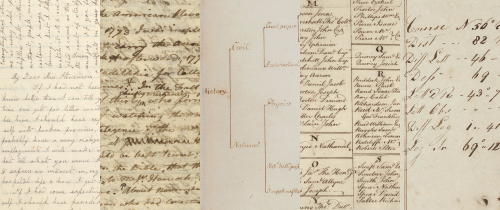Digital History Seminar on Projects Related to Public History and Documentary Editing

MHS Event
Presenters:
Tru Leverette Hall, University of North Florida
Clayton McCarl, University of North Florida
Maya Blackin, University of North Florida
Janaya Ferrer, University of North Florida
Laura Prieto, Suffolk University
Marta Crilly, Boston College
This is an online event.
This event showcases two digitization projects and their relationship with public history and documentary editing.
Editing the Eartha MM White Collection as Documentary Editing and Digital Public History
Based at the University of North Florida (UNF) in Jacksonville, Editing the Eartha MM White Collection (unfdhi.org/earthawhite) engages communities both on and off campus in publishing digital versions of the papers of White (1876-1974), an African American businesswoman, philanthropist, and civil rights leader whose vision and work continue to shape the region today. Since its founding in 2016, nearly sixty participants have worked with more than 217 documents, which include personal letters, professional correspondence, speech notes, event programs, newspaper clippings, and other items. The project operates as a partnership between the UNF Digital Humanities Institute, the UNF Africana Studies Program, and UNF’s Thomas G. Carpenter Library, where the collection is housed.
In this presentation, we consider Editing the Eartha MM White Collection from the perspective of two complementary approaches to working with archival material. We first locate the project within current documentary editing practice, describing our use of TEI-XML and Omeka to publish online, interactive full-text versions of materials that previously were available only as document images or through in-person consultation. We also analyze the project’s collaborative workflow as a type of digital public history praxis, looking in particular at how our on-campus and community workshops engage diverse constituencies in the recovery of local African American history. In conclusion, we reflect on the value of these processes for promoting awareness and appreciation of Jacksonville’s African American communities in the first three quarters of the twentieth century, a past that has been largely forgotten or erased.
A Searchable Past: Reframing Women's Suffrage through Voter Register Data
The Mary Eliza Project is a public humanities initiative that uses government records to illuminate diverse women’s political engagement in Boston. The city's Women’s Voter Registers from 1920 comprise 160 registers that are unindexed, handwritten, and difficult to read in manuscript form. The Mary Eliza Project partnered with the Boston City Archives to transcribe and research the names, addresses, occupations, ages, and other data points for over 50k new women voters. The searchable, sortable, publicly available 1920 Women's Voter dataset invites users of all types to understand better who these registrants really were. Our Mary Eliza Project instagram account contextualizes and builds on that data. Through storytelling, mapping, and data visualization, our team engages the public in learning more about the Boston women who claimed the vote, from factory workers to artists, teachers to housewives. Black women from the South and immigrants from around the world had to navigate complicated definitions of citizenship and other restrictions in order to qualify for suffrage. Placed in context, the register data challenges popular and scholarly assumptions alike about who was a "suffragist" -- a woman who wanted and valued political rights. We hope to empower others to investigate women's history for themselves, through relatively simple digital tools. The Mary Eliza Project opens the door not only to a "useable past" but also to a searchable one, a viewpoint that inspires questions as well as providing some answers.
Join the conversation at the L. Dennis Shapiro and Susan R. Shapiro Digital History Seminar. Seminars bring together a diverse group of scholars and interested members of the public to workshop a pre-circulated paper. Learn more.
Purchasing the $25 seminar subscription gives you advance access to the seminar papers of all seven seminar series for the current academic year. Subscribe at www.masshist.org/research/seminars. Subscribers for the current year may login to view currently available essays.
Online Event
The virtual seminar begins at 5:00 PM and will be hosted on the video conference platform, Zoom. Registrants will receive a confirmation message with attendance information.
By registering you are agreeing to abide by the MHS Visitor Code of Conduct.
